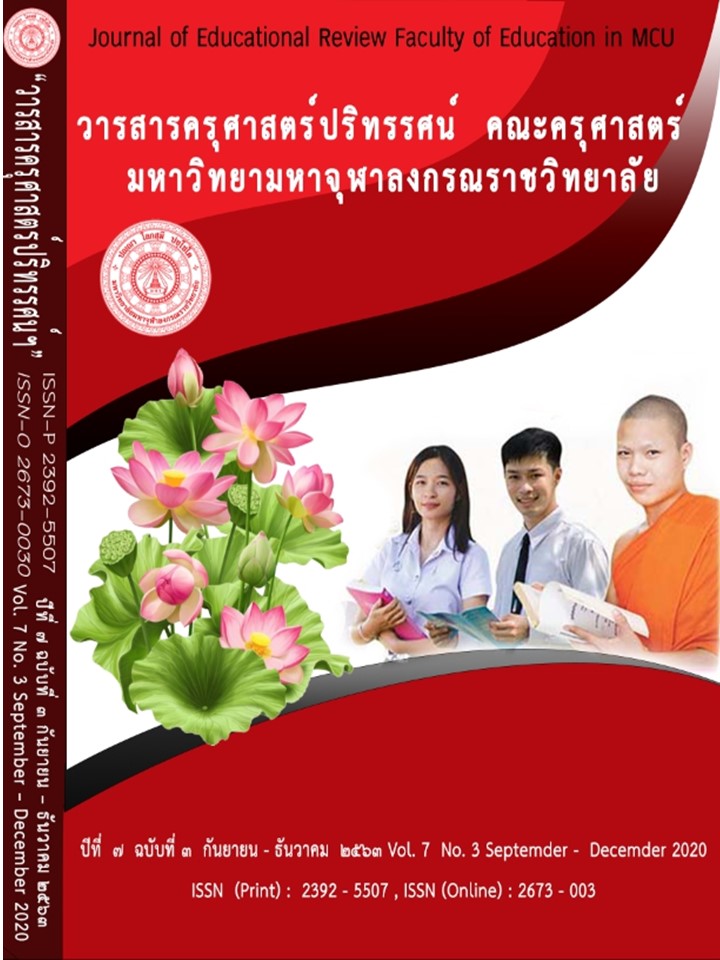PATICIPATORY COMMUNICATION BASED ON BUDDHIST EDUCATIONAL ADMISISTRATION IN DRIVING NATIONAL EDUCATION PLAN FOR NATIONAL EDUCATION COUNCIL
Main Article Content
Abstract
This research paper aimed to propose participatory communication based on Buddhist educational administration in driving the National Education Plan for the National Education Council. Qualitative research was designed and three research steps were conducted. Step 1: study the current conditions and problems of participatory communication in driving the National Education Plan of the National Education Council by documentary study. Step 2: develop a participatory communication approach based on Buddhist educational administration in driving the National Education Plan for the National Education Council by interviewing 10 key informants. Step 3: proposing participatory communication based on Buddhist educational administration in driving the National Education Plan for the National Council of Education with focus group discussion of 10 experts. Content analysis was used for data analysis all three steps. Results found that participatory communication based on Buddhist educational administration in driving the National Education Plan for the National Education Council. It is a guideline for the development of mechanisms and factors that will encourage a participatory communication process from all sectors both the top-down approach and horizontal communication to drive the national education plan to be responsive and cooperate in the continuous implementation of the plan under National Education 2017-2032. The direction of development of Thailand according to the National Strategy 20 consists of 1) principles, 2) objectives, 3) development process, 4) implementation, 5) conditions for success.
Article Details
ทัศนะและความคิดเห็นที่ปรากฏในบทความในวารสารฉบับนี้ถือเป็นความรับผิดชอบของผู้เขียนบทความนั้นเพียงผู้เดียว และไม่ถือเป็นทัศนะและความรับผิดชอบของกองบรรณาธิการ
กองบรรณาธิการขอสงวนสิทธิ์ในการคัดเลือกบทความลงตีพิมพ์และจะแจ้งให้เจ้าของบทความทราบหลังจากผู้ประเมินบทความตรวจอ่านบทความแล้ว
ต้นฉบับที่ได้รับการตีพิมพ์ในวารสารครุศาสตร์ปริทรรศน์ คณะครุศาสตร์ มหาวิทยาลัยมหาจุฬาลงกรณราชวิทยาลัย ถือเป็นกรรมสิทธิ์ของคณะครุศาสตร์ มหาวิทยาลัยมหาจุฬาลงกรณราชวิทยาลัย ห้ามนำข้อความทั้งหมดหรือบางส่วนไปพิมพ์ซ้ำ เว้นเสียแต่ว่าจะได้รับอนุญาตจากมหาวิทยาลัยฯ เป็นลายลักษณ์อักษร
References
เกศินี จุฑาวิจิตร. (2548). การสื่อสารเพื่อการพัฒนาท้องถิ่น. นครปฐม: มหาวิทยาลัยราชภัฏนครปฐม.
บ้านจอมยุทธ์. (2563). อปริหานิยธรรม 7. แหล่งที่มา https://www.baanjomyut.com/library_3/extension-3/aparihaniya/index.html สืบค้นเมื่อ 5 ม.ค. 2563
พระพรหมคุณาภรณ์ (ป. อ. ปยุตฺโต). (2556). พจนานุกรมพุทธศาสตร์ ฉบับประมวลธรรม. พิมพ์ครั้งที่ 25. กรุงเทพมหานคร: ผลิธัมม์.
พระมหาญาณวัฒน์ ฐิตวฑฺฒโน, อชิรญา ภู่พงศกร. (2559). นโยบายการศึกษาตามแผนพัฒนาเศรษฐกิจและสังคมแห่งชาติ. วารสารครุศาสตร์ปริทรรศน์ คณะครุศาสตร์ มหาวิทยาลัยมหาจุฬาลงกรณราชวิทยาลัย. 3(3). 30-46.
มหาวิทยาลัยจุฬาลงกรณราชวิทยาลัย.(2539). พระไตรปิฎกฉบับภาษาไทย ฉบับจุฬาลงกรณราชวิทยาลัย. กรุงเทพมหานคร: โรงพิมพ์มหาจุฬาลงกรณราชวิทยาลัย.
วราพร เอราวรรณ. (2560). การติดตามและประเมินผลการศึกษาตามแผนการศึกษาแห่งชาติ ฉบับปรับปรุง (พ.ศ. 2552 – 2559). วารสารวิจัย มสด สาขาวิทยาศาสตร์และเทคโนโลยี. 13(3). 3-19.
สำนักงานเลขาธิการสภาการศึกษา. (2560). แผนการศึกษาแห่งชาติ พ.ศ. 2560 – 2579. กรุงเทพมหานคร: พริกหวานกราฟฟิค.
Thomus Tufte and Paolo Mefaloputlos. (2009). Participatory Communication A Pratical Guide. Washington DC: The World Bank.
United Nations. (1983). Popular participation as a strategy for promoting community level action and nation development. New York: United Nations.


